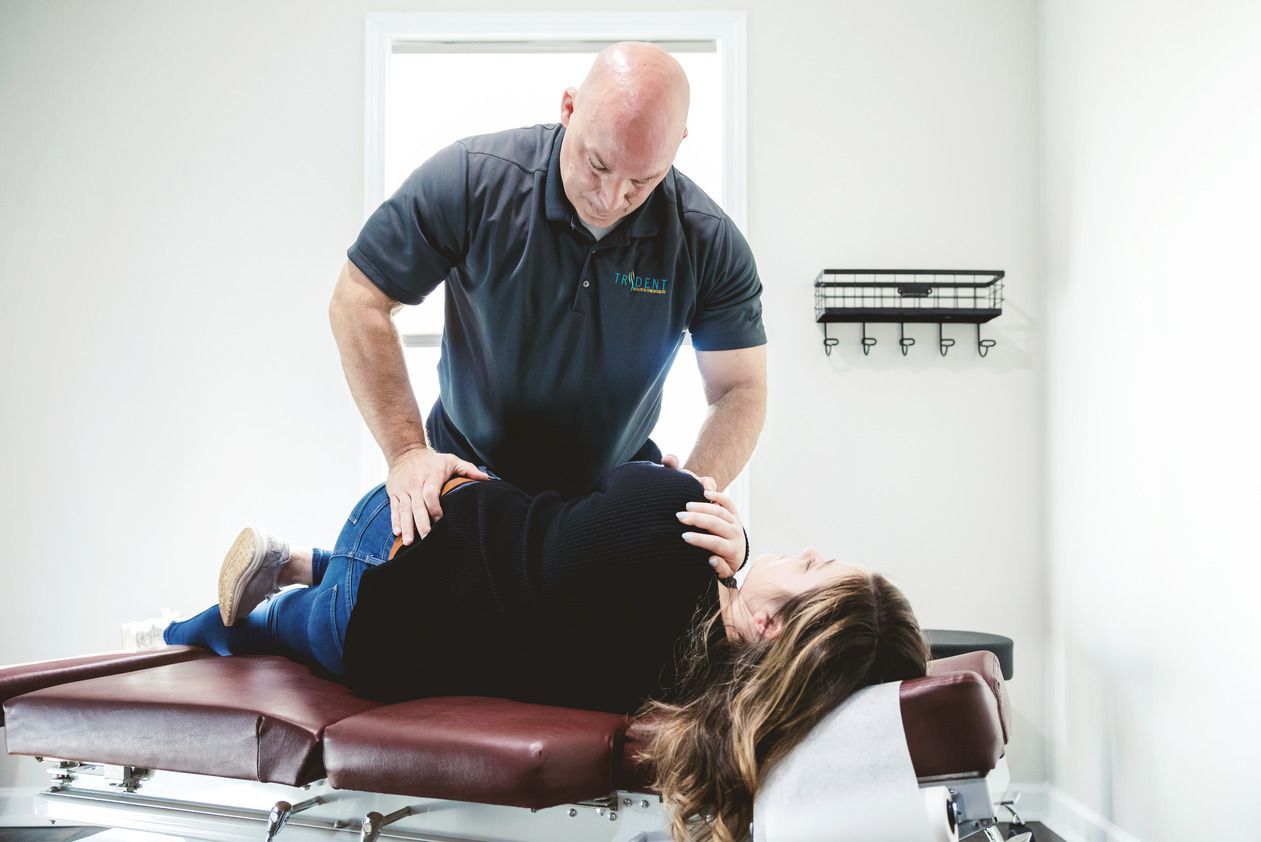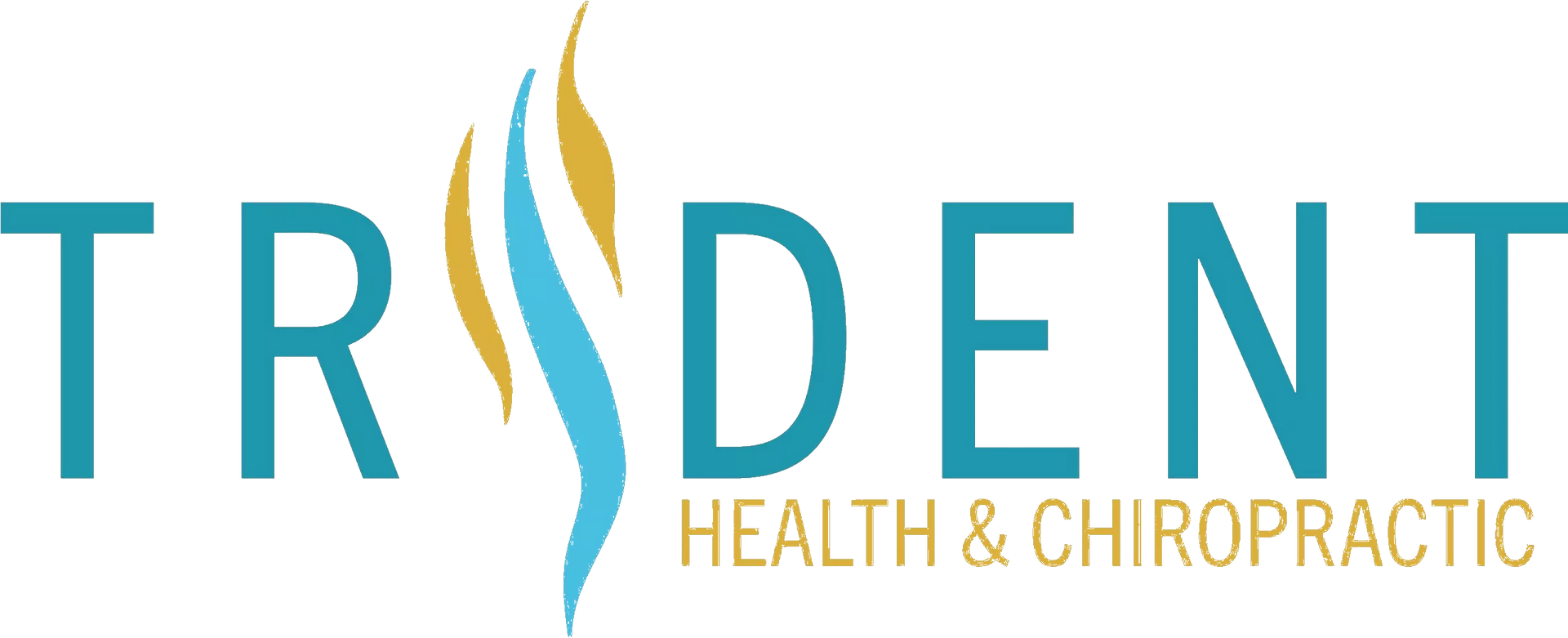Get to the Root of Your Sciatic Pain
At Trident Health and Chiropractic, we use gentle, personalized care to help relieve sciatic pain at the source, so you can move comfortably again.

What is Sciatica?
If you’ve been feeling pain that shoots from your lower back down your leg, you may be dealing with sciatica. It’s a very common issue that affects millions of people, and it can be frustrating, exhausting, and at times, even scary.
Sciatica happens when the sciatic nerve (the longest nerve in your body) gets irritated. That nerve runs from your lower back, through your hips and glutes, and down the back of each leg. When it’s inflamed or pinched, it can cause pain, burning, tingling, or numbness that makes your daily movements more painful and difficult.
It’s important to know that sciatica isn’t a condition on its own; it’s a symptom. That means something else is going on in your body that needs some attention. Maybe it’s a herniated disc in your spine, spinal misalignment, or muscle tension that’s putting pressure on the nerve.
At Trident Health & Chiropractic, we take the time to understand what’s really causing your discomfort. Our approach is gentle, thorough, and always specifically customized to you and your unique needs. We focus on treating the root of the problem, and not just covering up the pain, so that you can start moving and living more easily again
Common Causes of Sciatic Pain
Sciatica usually happens when something puts pressure on or irritates the sciatic nerve. While the symptoms may feel similar, the underlying causes can vary from person to person.
Herniated or Bulging Disc
When a spinal disc slips or bulges out of place, it can press directly on the sciatic nerve, which causes pain, numbness, or tingling that travels down the leg.
Spinal Stenosis
This condition happens when the spaces in your spine start to narrow, putting pressure on the nerves. It can often lead to pain that gets worse when you stand or walk for long periods.
Spondylolisthesis
This occurs when one vertebra shifts forward over the one below it, which can pinch or irritate the sciatic nerve and cause lower back and leg pain.
Piriformis Syndrome
The piriformis is a small muscle that is located deep in the buttocks. If it tightens or spasms, it can press on the sciatic nerve and mimic the symptoms of sciatica.
Injury or Trauma
A fall, accident, or any type of strain to the lower back, pelvis, or buttocks can cause inflammation or nerve irritation that leads to sciatic pain.
Degenerative Disc Disease
As we age, our spinal discs naturally wear down. This can lead to instability, inflammation, or bone spurs that irritate the sciatic nerve.
Pregnancy-Related Spinal Stress
The extra weight that you carry, and your shifting posture during pregnancy, can put added pressure on the spine and sciatic nerve, causing temporary sciatic pain.
Tumors or Infections (Rare)
In very rare cases, growths or infections near the spine or pelvis can affect the sciatic nerve. These are uncommon but are important to rule out when evaluating your symptoms
The good news is that holistic care tailored to address the root cause of your discomfort can alleviate not only the sciatica, but also what’s causing it. Through a mixture of
chiropractic care,
Softwave Therapy, and other healing modalities, we address pain to ensure lasting relief.
Experience Relief.
How Sciatica Feels
Sciatica can feel a little different for everyone. For some, it’s a dull ache that comes and goes. For others, it’s sharp and sudden—making it hard to move through the day. Whether your symptoms are mild or intense, it’s important to listen to what your body is telling you.
Here are some signs your body is telling you it’s time to come see us here at Trident.
Radiating pain from the lower back down one leg
This is perhaps the most classic symptom: pain that starts in your lower back or hip and travels down through your buttock, thigh, or even all the way to your foot.
Sharp, burning, or shooting sensations
Sciatica pain often feels electric, sharp, or intensely hot, especially when the nerve is under pressure.
Numbness or tingling in the leg or foot
You might feel pins and needles, a dull numbness, or strange sensations anywhere on the affected leg.
Muscle weakness
In some cases, sciatica can make it difficult to lift your foot, step down firmly, or stand properly due to the pressure on the nerve that affects muscle control.
Trouble sitting, standing, or walking for long periods
Certain positions may increase your pain, especially sitting for long stretches or getting up after you’ve been resting.
Pain that worsens with movement or specific positions
Bending, twisting, coughing, or even sneezing may make the pain worse when the nerve is inflamed.
If any of these symptoms sound familiar, you're not alone, and you're in the right place to find lasting relief.
How We Treat Sciatica at Trident
Our goal isn’t just to quiet the symptoms; it’s to truly get to the root of the problem and understand what’s causing them. Every spine is unique, so every care plan we create is tailored specifically to you. We take the time to learn about your pain, your lifestyle, and what relief means to you.
Here’s how we help ease sciatic pain and encourage long-term healing.
Chiropractic Adjustments
Gentle, precise adjustments help realign the spine and reduce pressure on the sciatic nerve, allowing you to move more freely and with less pain.
SoftWave Therapy
This advanced, non-invasive treatment uses sound waves to stimulate healing in damaged tissue and calm down any inflammation around the nerve.
ThermoStim Therapy
A powerful combination of heat and gentle electrical stimulation that helps relax tight muscles, ease any nerve irritation, and relieve pain naturally.
Postural & Movement Guidance
We’ll help you identify any daily habits, positions, or movements that may be aggravating your symptoms, and teach you how to move in ways that protect and strengthen your spine.
Lifestyle Support
We give you guided stretches and at-home care routines that will equip you with the simple tools you need to feel better between visits and stay on the path to long-term relief
Are you ready to take the next step, pain-free?
Healing Sciatica Isn't One-Size-Fits-All.
Neither Is Our Care
At Trident Health & Chiropractic, we know that sciatic pain can interrupt every part of your life, from walking, sitting, sleeping, and even just getting through your day. That’s why we treat more than the symptoms. We take the time to understand what’s really going on, so we can create a care plan that’s tailored to you and the way that you live.
You’ll receive real answers, thoughtful treatment, and gentle techniques that help your body do what it’s meant to do: heal naturally. With advanced therapies like SoftWave and ThermoStim, expert chiropractic care, and a calming environment that feels more like a spa than a clinic, we’re here to make sure that you feel safe, supported, and on your way toward lasting relief.
Over 250 patients in Spartanburg have trusted us with their care, and we’d be honored to help you, too. Book your first appointment with us today or call (864) 453 -0392 to get started.
Frequently Asked Questions
How do I know if my pain is from sciatica?
If you’re feeling pain that starts in your lower back and travels down one leg (sometimes with tingling, numbness, or weakness), it could be sciatica. A proper exam can help confirm the cause and ensure the right treatment.
What makes sciatica worse?
Long periods of sitting, poor posture, heavy lifting, or certain repetitive movements can aggravate the sciatic nerve. Everyone’s triggers are a little different, which is why personalized care matters.
Can chiropractic care really help with sciatica?
Yes! Chiropractic care helps reduce pressure on the sciatic nerve by gently realigning the spine and improving your mobility. It not only helps alleviate your sciatica but also addresses the underlying condition causing it. Many patients experience significant relief and better function over time.
What exercises help relieve sciatic pain?
Gentle stretches that open the hips, loosen the lower back, and strengthen your core can be very helpful. We’ll guide you through the right ones for your unique body and condition.
How long does it take to feel better?
Some people notice improvement after just a few visits. For others, especially with long-standing issues, it may take a little more time. We’ll talk through what to expect based on your specific case. Additionally, we recommend ongoing adjustments for each patient to maintain proper alignment and prevent the issue from recurring.
Should I rest or stay active with sciatica?
A little rest is okay during a flare-up, but gentle movement is usually best. Staying active with the right guidance can help ease away the pain and prevent future flare-ups.





